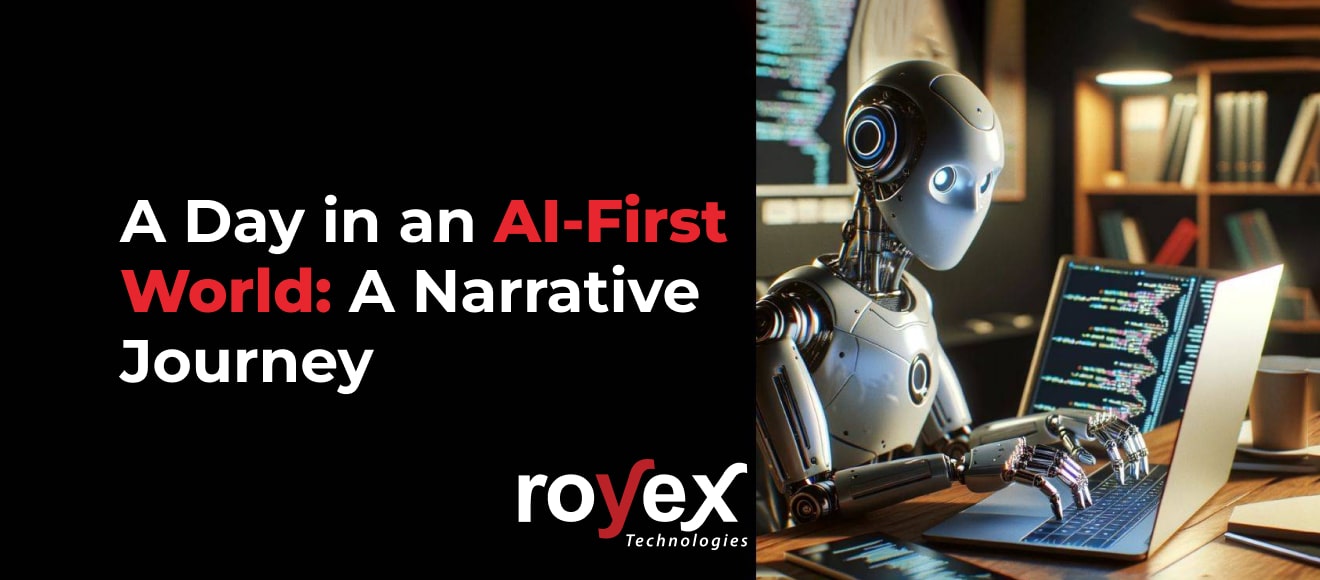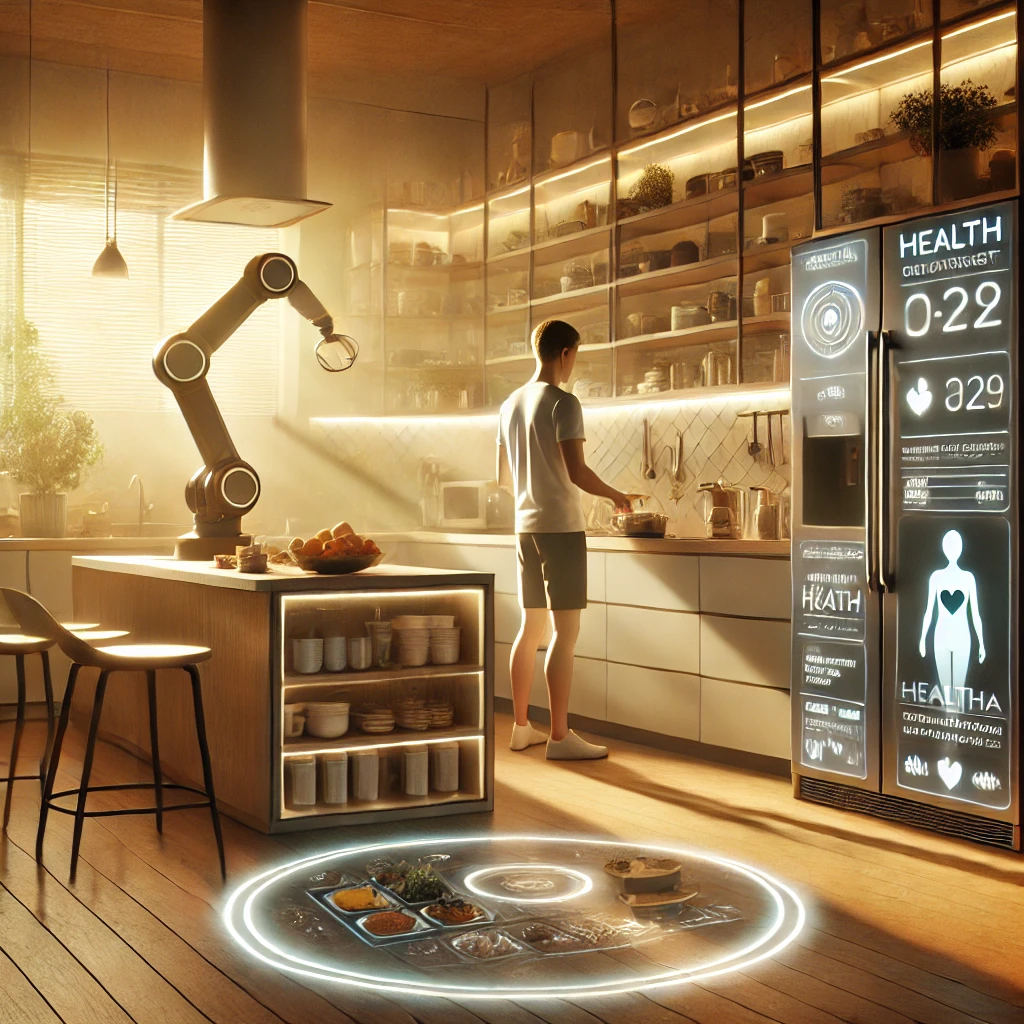
A Day in an AI-First World: A Narrative Journey
Imagine waking up to the soft, melodic chime of your AI-powered alarm, customized to your preferred waking time and tuned to your sleep patterns. As you stir, your bedroom environment automatically adjusts—curtains gently part to let in the morning light, the temperature rises to your desired comfort level, and the smell of freshly brewed coffee wafts through the air, prepared just moments before by your AI-assisted kitchen.
Your day begins with a glance at the holographic display projected in the air beside your bed. The AI has already curated a summary of your day's agenda, complete with meetings, tasks, and personal reminders. It also presents a personalized news briefing, tailored to your interests and filtered for relevance and accuracy by an AI that understands your preferences.
Morning Routine with AI Assistance

As you step into the bathroom, the mirror greets you with a friendly "Good morning." The smart mirror conducts a quick health scan, analyzing everything from your skin condition to vital signs. It suggests a skincare routine and provides a health summary, noting that your hydration levels are slightly low and recommending a glass of water before breakfast.
Your kitchen, an epitome of automation, has prepared a balanced breakfast based on your dietary preferences and nutritional needs. The AI chef considers your health goals—whether it's muscle gain, weight loss, or just maintaining energy throughout the day—and adjusts the meal accordingly. As you eat, your AI assistant engages you in a light conversation or a brief meditation session, based on your mood and the level of relaxation it detects you need.
Commute in an AI-Driven World
Once you’re ready to leave, your self-driving car is already waiting at the door. The AI has optimized your route, taking into account real-time traffic, weather conditions, and even your mood. The commute, once a source of stress, is now a time for relaxation or productivity. If you wish, the AI can play your favorite podcast, or you can engage in a virtual meeting, fully immersed in an augmented reality environment while the car handles the driving.
As you pass through the city, the landscape is a testament to AI integration. Traffic flows seamlessly, managed by AI systems that communicate with each other to prevent congestion. Buildings are powered by AI-controlled energy grids that optimize electricity usage, reducing waste and ensuring sustainability. Smart billboards change their ads based on the demographic of the pedestrians nearby, offering a personalized yet unobtrusive experience.
Work in an AI-First Environment
Arriving at your office, you find that your AI assistant has already prepared everything you need. It has summarized key points from emails, arranged documents in order of importance, and even drafted responses for your review. The AI has also scheduled meetings and ensured that all necessary resources are available.
Your workday is a collaborative effort between you and AI systems. Routine tasks, such as data analysis or scheduling, are handled by AI, freeing you to focus on creative and strategic decisions. If you work in a creative field, your AI might suggest ideas or generate prototypes, which you can then refine. In a more technical role, AI can assist with simulations, predictions, and even problem-solving, acting as a powerful tool rather than a replacement.
Breaks are no longer mundane; they’re opportunities for rejuvenation. Your AI recommends a short walk, knowing from your health data that you’ve been sedentary for too long. As you stroll through a nearby park, AI-powered drones maintain the greenery, ensuring a harmonious blend of nature and technology.
Evening in a Smart Home
After a productive day, you return home, where your house has prepared for your arrival. The lighting adjusts to a calming hue, the temperature is perfect, and your favorite playlist is softly playing in the background. Dinner is already in the works—an AI-suggested recipe based on what’s available in your fridge and tailored to your evening plans.
You decide to relax by watching a movie. Your AI, aware of your preferences, suggests a few options and adjusts the room's acoustics for an immersive experience. If you’re in the mood for something different, the AI can create a custom story or even simulate a virtual reality adventure.
Before bed, you might engage in a conversation with your AI, reflecting on your day or discussing plans for tomorrow. The AI can offer insights, suggest improvements, or simply listen, providing a form of companionship that, while artificial, is deeply attuned to your needs.
Nighttime Care and Future Visions
As you prepare to sleep, your home enters a nighttime mode. The lights dim, the thermostat lowers slightly, and the AI initiates a calming audio track or a guided meditation. It reminds you of any important tasks for tomorrow and reassures you that everything is set.
While you sleep, the AI continues to work. It monitors your home’s security, optimizing energy usage, and even adjusting your sleeping environment if it detects restlessness. It also processes the data collected throughout the day, learning from your behavior to better serve you tomorrow.
In this AI-first world, your day is a seamless blend of human intuition and AI precision. The technology supports your well-being, enhances your productivity, and frees you from mundane tasks, allowing you to focus on what truly matters. It’s a world where AI doesn’t just assist—it enriches every aspect of life, creating a harmonious balance between man and machine.
The future, as depicted in this narrative, is not one of cold, emotionless efficiency but of personalized, intuitive experiences that elevate human potential. It’s a vision of a world where AI is a partner, not just a tool—a future where technology is not just advanced but deeply integrated into the fabric of daily life.





